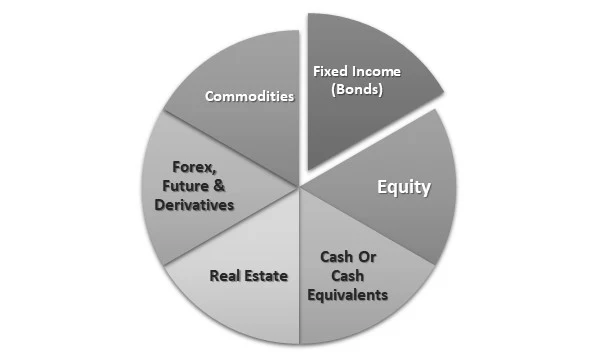Where To Invest?
Knowing, why you should invest, you must select an asset class that matches your risk and return preferences.
Types of Asset classes
Financial market specialists put money into numerous asset classes to diversify their investor's portfolios and manage the risk in the marketplace.
The following are some of the popular asset classes :- Fixed Income (Bonds)
- Equity
- Cash or Cash equivalents
- Real Estate
- Forex, Future and other derivatives
- Commodities

Equity
Equity measures ownership of any asset. In simple words what an owner could receive in payment if all assets were liquidated and all its debt was paid off.
For example: If you own a house worth $70,000, but you owe $20,000 on that house, the house represents $50,000 equity.
Investment in equity involves buying and selling shares in a publicly listed company.
Unlike a fixed income instrument, investment in equity involves risk. Every country has its own exchange board where the stocks are traded.
Formula to calculate shareholder equity
Shareholder's Equity = Total Asset - Total Liabilities
Investment in equity has generated a return close to 14-15% CAGR (Compound Annual Growth Rate) over the long term.
Real Estate
It involves ownership of a physical space (commercial and non-commercial land). Real Estate is less risky and has less volatility than equity. One can earn either by rental income or capital appreciation of the physical space. Properties give a good long-term return. It would be so difficult to say about the return in real estate as there is no official metric to measure the return. The best part in real estate investment is it involves lots of "Tax" deductions.
Cash Asset
Cash Asset involves high liquidity and power to buy anything. Cash can be used to purchase other assets. Here point to be noticed is that Cash Assets don't include what you need for daily living like Car.
Commodity
Investment in commodities can be incredibly rewarding if you manage your risk. A commodity market is a marketplace where raw products are traded rather than manufactured products. Gold, silver, coffee, etc. are traded in the commodity marketplace. To regulate the trading of commodities, there are many commodity exchanges. From a long-term perspective, you can expect up to a 10% return.
Fixed Income Bonds
Fixed Income Bonds provide fixed interest payments periodically and the eventual return of the principal when the security reaches maturity. These instruments are issued by the government, non-government corporations, banks, and other entities to finance their operations.
Typically Fixed Income investment includes :
- Municipal Bonds
- Bonds issued by corporates
- Treasury Bonds
- Bank Deposite
- Senior citizen savings scheme
- Bonds issued by the government
- Bonds offered by banks